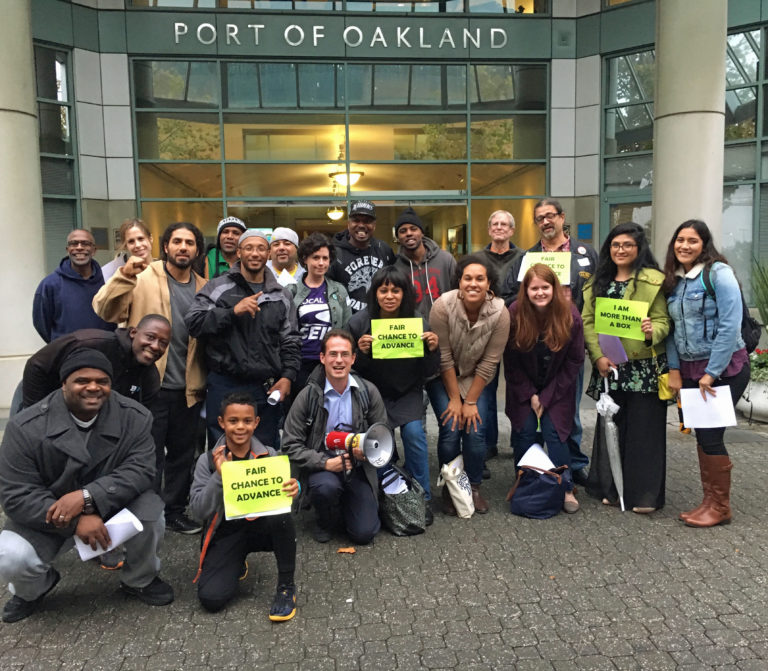Port of Oakland Passes Groundbreaking Jobs Policy
Nov 11, 2017

After 21 months of negotiations with the local community, the Port of Oakland Board of Commissioners voted Thursday to approve a “Good Jobs” policy on the Port’s new state-of-the-art warehousing complex.
Community groups say this be one of the most equitable job policies in the warehousing and logistics industry, setting a standard for online retailers like Amazon. And because it provides pathways to good jobs for primarily low-income people of color, it begins to curb economic inequality and structural racism.
A number of environmental groups asked the Port Commission to the delay the vote, but the commission voted unanimously to approve the lease.
Calling for postponement was a group of regulators, local, regional and national environmental advocates who requested the commission delay accepting this lease until port staff engages in good faith negotiating on the environmental elements of the new warehouse. The environmental group says it is committed to jobs but just as committed to clean air and healthy neighborhoods in West and East Oakland and the 880 corridor.
So far, the port has agreed to discuss the group’s environmental concerns but never scheduled meetings, according to the environmentalists.
The warehouse development sits on the port’s side of the former Oakland Army Base – a massive, incredibly valuable, publicly-owned property. OaklandWorks and Revive Oakland, a coalition of community, labor, and faith groups, led the negotiations with the Port and won an even stronger agreement than its 2012 deal on the city-owned part of the Army Base.

With the rise of online retailers like Amazon, jobs in warehousing and logistics – or “goods movement” – have become increasingly common. These jobs are typically low-paying and often part-time, temporary, and/or subcontracted.
The new port warehouse jobs policy establishes a model that other cities could follow, including living wages; limitations on the use of temporary agencies; equal protections for subcontracted workers; and one of the strongest Ban the Box policies in the country.
“As the port becomes a gateway for the booming tech, online, and app-centric economy, we are creating policies that lift low-income workers and communities of color,” said Jahmese Myres, Revive Oakland Coalition Director.
“With racism and economic inequality on the rise during the Trump Era, we are helping to ensure that low-income people of color have good jobs and can stay in their homes,” she said.
Cities across the country recently submitted proposals to lure Amazon to build their new headquarters in their areas. The bidding war outlined community giveaways rather than what the company could do for cities struggling to create living wage jobs with benefits that would allow workers to afford housing and provide for their families.
This comes at a time when low-income communities of color are increasingly being pushed out of many urban areas due to the high cost of housing and the lack of opportunity for formerly incarcerated workers.
However, the port agreement can serve as a model for how community driven negotiations result in better outcomes for workers and residents, particularly people of color who have been shut out of good jobs.
In addition to living wages, the agreement would mandate local hire, equal protections for subcontracted workers, and one of the strongest “Ban the Box” policies in the country. The latter curtails discrimination against the formerly incarcerated, who are disproportionately people of color.
“With one of the strongest Ban the Box policies in the country, the Army Base redevelopment is standing against discrimination, employment inequality, and the racial injustices that we face daily,” said Saabir Lockett, a formerly incarcerated Oakland resident.
“Policies like this create a more sustainable relationship between employers and local residents, giving more of us the chance to provide for our families with dignity,” said Lockett.